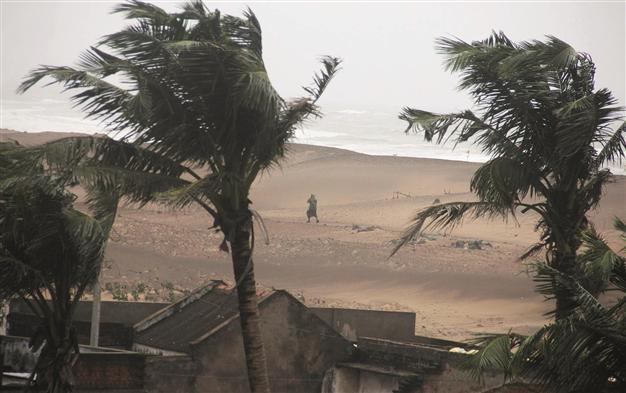Cyclone Hudhud hammers India’s eastern seaboard
VISAKHAPATNAM, India - Reuters

A man walks as strong winds blow along a beach in Gopalpur in Ganjam district in eastern India, Oct. 12. REUTERS Photo
Cyclone Hudhud blasted India’s eastern seaboard Oct. 12 with gusts of up to 195 kilometers an hour, uprooting trees, damaging buildings and killing at least two men despite a major evacuation effort.
The port city of Visakhapatnam, home to two million people and a major naval base, was hammered as the cyclone made landfall, unleashing the huge destructive force it had sucked up from the warm waters of the Bay of Bengal.
Fallen trees and wreckage were strewn across the streets of Visakhapatnam, known to locals as Vizag. Most people heeded warnings to take refuge, but two men who ventured out were killed - one by a falling tree, the other when a wall collapsed.
“The Visakhapatnam situation is very serious,” K. Hymavathi, the special commissioner for disaster management for Andhra Pradesh state, told Reuters by telephone. “Telecommunications are disrupted - even our control room is not able to operate properly. People staying in their apartments are so afraid that they are panicking and calling us,” she said, confirming that Hudhud had made landfall before noon local time.
India’s disaster relief agency organized the evacuation of more than 150,000 people on Oct. 11 to minimize the toll from Hudhud - which is similar in size and power to cyclone Phailin that devastated the area one year ago to the day.
The India Meteorological Department (IMD) forecast a storm surge of 1-2 meters above high tide that could result in flooding of low-lying coastal areas around Visakhapatnam, Vijayanagaram and Srikakulam.
A Reuters reporter staying in Vizag said his hotel had suffered broken windows while the ground floor was flooded by lashing, horizontal rain. Hotel staff abandoned efforts to keep the water out when they were blown back several meters by the wind. They were only able to regain their footing by linking arms, and retreated quickly into the hotel.
The winds were deafening, the reporter said, sounding at times like explosions going off.
“I never imagined that a cyclone could be so dangerous and devastating,” said a businessman from the western state of Gujarat staying in the hotel.
